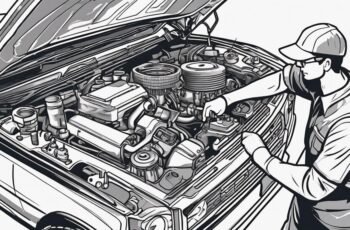When it comes to environmentally-friendly septic tank pumping, keeping up with regular maintenance is key. Efficient Pumping Frequency, Sustainable Waste Disposal Methods, Eco-Friendly Septic Additives, and Soil Preservation Techniques all play a crucial role in minimizing your impact on the environment.
But how can you ensure that these tips are effectively implemented to benefit both your property and the planet? Let's explore simple yet effective strategies that can make a significant difference in the sustainability of your septic system.
Key Takeaways
- Regular pumping every 3-5 years maintains optimal performance and prevents costly issues.
- Implement eco-friendly septic additives to enhance efficiency and sustainability.
- Practice soil preservation techniques to ensure ecosystem health and functionality.
- Invest in cost-effective solutions for routine maintenance to save money and promote longevity.
Efficient Pumping Frequency

To maintain a well-functioning septic system, regular pumping every 3-5 years is recommended to prevent issues and ensure optimal performance. This optimal timing is crucial in preventing costly repairs and maintaining the efficiency of your septic tank. By adhering to this schedule, you can avoid unpleasant backups, odors, and environmental contamination. Neglecting proper maintenance can lead to clogging, overflow, and the need for more frequent and expensive pump-outs.
Cost-effective solutions are available for septic tank pumping, with many service providers offering competitive rates for routine maintenance. By investing in regular pumping, you not only save money in the long run but also contribute to the longevity of your septic system. It's essential to consider the financial aspect alongside the environmental benefits of proper maintenance.
Sustainable Waste Disposal Methods
Maintain eco-friendly septic systems by implementing sustainable waste disposal methods that minimize environmental impact and promote long-term system efficiency. Green septic solutions and eco-conscious waste management practices are crucial for reducing the ecological footprint of septic systems. Consider implementing techniques such as composting toilets, which can divert organic waste from entering the septic system altogether.
Additionally, utilizing a greywater recycling system can help reduce the volume of wastewater that needs treatment, thus lessening the load on the septic tank.
Regularly inspecting and promptly repairing any leaks or damages in the plumbing system can prevent contaminants from entering the septic tank and soil. Properly managing household waste by composting organic materials and reducing the use of harsh chemicals can also contribute to a more sustainable septic system.
Eco-Friendly Septic Additives

Implementing eco-friendly septic additives can enhance the efficiency and sustainability of your septic system. When choosing biodegradable solutions for your septic system maintenance, you aren't only caring for the environment but also ensuring the longevity of your system. Here are three reasons why incorporating green maintenance practices is beneficial:
- Reduced Harmful Chemicals: By opting for biodegradable additives, you prevent harmful chemicals from entering the soil and water supply, safeguarding the ecosystem around your property.
- Enhanced Microbial Activity: Green additives promote the growth of beneficial bacteria in your septic tank, aiding in the breakdown of waste and reducing the likelihood of clogs and backups.
- Long-Term Sustainability: Choosing eco-friendly options ensures the long-term sustainability of your septic system, reducing the need for frequent maintenance and costly repairs.
Soil Preservation Techniques
Incorporating soil preservation techniques into your septic system maintenance regimen is crucial for ensuring the long-term health and functionality of your property's ecosystem. Soil conservation practices play a vital role in maintaining the balance of nutrients and microorganisms essential for the soil's health.
Implementing measures such as minimizing soil compaction by avoiding heavy machinery on the drain field, planting native vegetation to prevent erosion, and maintaining proper vegetation cover can significantly contribute to soil preservation.
Moreover, groundwater protection is closely linked to soil conservation. Contaminants from poorly maintained septic systems can leach into the soil and eventually reach groundwater sources, posing risks to human health and the environment. By adopting soil preservation techniques, you not only safeguard the quality of your soil but also protect precious groundwater reservoirs.
Frequently Asked Questions
Are There Any Specific Regulations or Guidelines in Place for Environmentally-Friendly Septic Tank Pumping Practices?
To follow environmentally-friendly septic tank pumping practices, consider adhering to specific environmental regulations and best practices. Sustainable solutions and green technology can enhance the process, ensuring minimal impact on the environment.
How Can Homeowners Ensure That Septic Tank Pumping Services They Hire Are Using Eco-Friendly Practices and Equipment?
Want to guarantee eco-friendly septic tank pumping? Ensure hired services use green solutions, sustainable practices, and eco-friendly equipment. Verify their commitment to reducing environmental impact through their methods and equipment choices.
Are There Any Potential Risks or Drawbacks to Using Eco-Friendly Septic Additives in a Septic System?
Using eco-friendly additives in your septic system can pose potential risks and drawbacks. While they aim to be sustainable, improper use may disrupt the system's balance, leading to clogs, odors, or inefficiencies.
What Are Some Alternative Methods for Maintaining Septic Tanks That Are Not Covered in the Article?
Looking to maintain your septic tank with alternative methods? Consider DIY solutions like regular inspections and proper waste disposal. Explore innovative technologies such as advanced monitoring systems. Embrace natural remedies and sustainable practices for a greener approach.
How Can Homeowners Prevent Damage to Their Soil and Surrounding Environment During the Septic Tank Pumping Process?
To prevent damaging the soil and environment during septic tank pumping, follow sustainable practices. Implement proper waste management techniques to minimize environmental impact. Soil conservation is crucial. Undertake responsible measures for a sustainable and eco-friendly septic tank maintenance process.
Conclusion
By implementing environmentally-friendly septic tank pumping tips, you can ensure the longevity and efficiency of your septic system. These sustainable practices not only benefit the environment but also save you money in the long run.
Stay tuned for more innovative solutions to optimize your septic system and reduce your carbon footprint. The future of septic tank maintenance is bright, and you can be a part of it by making simple yet impactful changes today.

